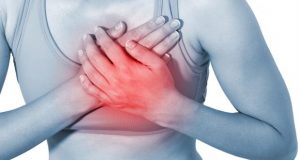
Eisenmenger syndrome – causes, side effects and treatments at NaturalPedia.com
Friday, March 16, 2018 by Jessica Dolores
http://www.naturalpedia.com/eisenmenger-syndrome-causes-side-effects-and-treatments-at-naturalpedia-com.html

Eisenmenger syndrome is a disease that occurs when blood circulates in an abnormal way because a hole in the heart between its pumping chambers – the left and right ventricles – circumvents oxygen-filled blood from the lungs back to it. Therefore, the life-sustaining blood doesn’t circulate to the rest of the body.
The disease is rare, and progressive. What’s even more worrisome is the telltale signs do not show until the sick person is in his 20s or 30s.
The rate at which the disease progresses varies from person to person. Some feel the symptoms more slowly. Others feel worse at once.
But all symptoms have one thing in common. They stem from inadequate oxygen supply to the cells.
The most obvious symptom is bluish or grayish skin. The fingernails and toenails are large and rounded. The person tires easily and falls short of breath. He or she feels chest pain and palpitations. There’s fainting, coughing up of blood and dizziness.
The person’s fingers or toes feel numb, or they have a tingling sensation. The head aches and the abdomen swells.
The sick person may have anemia, a greater tendency to develop blood clots, prolonged bleeding, kidney illness and tricuspid valve regurgitation.
Tricuspid valve regurgitation is a condition where a heart valve fails to close the right way, thus letting blood return into the atria. Thus, the person feels weak and tired. He has swollen ankles, feet and abdomen. Worse, his heart totally fails.

Known risk factors and symptoms of Eisenmenger syndrome
Eisenmenger syndrome happens when the inborn heart problem isn’t discovered early before the lung arteries are damaged.
A family history of heart problems raises the risk of a woman giving birth to an infant with the disease.
The cardiologist will run a series of tests, including a complete blood count, pulse oximetry, chesst x-ray, electrocardiography (EKG) and echocardiography.
The doctor may examine the condition further through magnetic resonance imaging (MRI), transesophageal echocardiogram (TEE), or cardiac catheterization.
Men and women are at equal risk for the disease. People diagnosed with the illness must seek treatment at once. But those with a family history of Eisenmenger syndrome may lower their risk of developing the disease later in life by loading up on healthy food.
Body systems affected by Eisenmenger syndrome
The disease affects various organs of the body, thus leading to the following complications:
- Low oxygen levels in the blood (cyanosis)
- High red blood cell count (erythrocytosis)
- Arrhythmia, which leads to enlarged or thickened walls in the heart
- Sudden cardiac arrest
- Heart failure
- Coughing up blood
- Stroke
- Kidney problems and increased susceptibility to gout
- Pregnancy risks
Food items or nutrients that may prevent or relieve Eisenmenger syndrome
You may reduce your risk by adding the following nutrients and foods to your diet:
- Coenzyme Q10 (CoQ10), is a substance similar to a vitamin that is found in organ meats like liver, kidney and heart, along with beef, sardines and mackerel. Greens like spinach, broccoli and cauliflower are also rich in CoQ10.
- Omega-3 fatty acids, found in mackerel, salmon, cod liver, herring, oysters, sardines, anchovies, caviar, flaxseeds, chia seeds, walnuts and soybeans.
- Green tea
- Pomegranate juice
- Magnesium and potassium, found in nuts and seeds, legumes, whole grains, fruits and vegetables , dairy and animal products.
- Garlic
- Hawthorn
- Arjuna
- Chinese hibiscus
- Turmeric
- Cayenne
People with Eisenmenger syndrome must stick to a healthy lifestyle more than ever to keep their condition from worsening.
They are advised to quit smoking, since tobacco harms the heart and blood vessels. They are also encouraged to find exercise they enjoy. Lane swimming doesn’t tax the joints the way other forms of exercise do. Cycling raises heart rate, burns calories and boosts cardiovascular fitness. Weight training builds muscle mass, helps burn fat and is good for bone and heart health. Yoga fights stress, lifts spirits, helps digestion and helps the heart do its job better.
Where to learn more
- Reversing heart disease
- Easy-peasy way to rid heart disease
- Energy drinks have a far more drastic effect on heart health than many are aware: Just two drinks a day can make your blood pressure soar
- Medicine.news
- NaturalCures.news
Summary
Eisenmenger syndrome need not be the death sentence it used to be. Treated early, and kept in check through nutritious food and a healthy lifestyle, people afflicted with the disease can life longer, and better.
Sources include:
Tagged Under: Tags: eisenmenger syndrome





